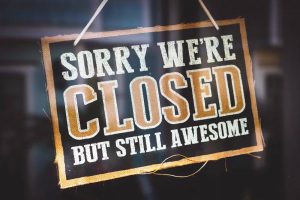
COVID-19 has brought many unwelcome changes, not only to our daily lives, but to our businesses as well. St. Augustine, like other towns in Florida, rely on tourism and many local businesses have taken a hard hit. Due to state restrictions and other new rules, bars, hotels, and restaurants are finding it difficult to attract customers and keep up with the terms of their leases. Furthermore, landlords are finding themselves in the difficult position of trying to collect rent, while simultaneously being empathetic to their renters’ predicament. What options are available?
 Many tenants operating a business in St. Augustine are finding themselves in the untenable position of both complying with executive orders and being able to make timely rent payments. How can they generate enough revenue to make rent when the state orders that their businesses either close or restrict services? To address this issue, a careful review of their lease agreement is necessary. Remember, lease agreements are contracts and failure to perform under the contract can have consequences. Some defenses may be available under such terms as may be provided by a force majeure clause, which can allow for non-performance. Whether a tenant can excuse performance based on this clause or assert other defenses can require complicated legal analysis.
Many tenants operating a business in St. Augustine are finding themselves in the untenable position of both complying with executive orders and being able to make timely rent payments. How can they generate enough revenue to make rent when the state orders that their businesses either close or restrict services? To address this issue, a careful review of their lease agreement is necessary. Remember, lease agreements are contracts and failure to perform under the contract can have consequences. Some defenses may be available under such terms as may be provided by a force majeure clause, which can allow for non-performance. Whether a tenant can excuse performance based on this clause or assert other defenses can require complicated legal analysis.
Although defenses to non-performance are valuable, it’s often best to seek alternative means to comply with the lease agreement. Luckily, the government is taking steps to help tenants during this difficult time. Billions of dollars have been made available to small businesses in order to provide some relief. Many tenants are taking advantage of these loans to assist with rent payments, payroll, and other operating costs. Some loans allow between $50,000-$100,000 of relief and are interest free for the first year. There are certain conditions however, so a careful review of the business and loan terms should be a priority when considering your options. This path is preferable because it demonstrates to the landlord that you are putting forth your best efforts to comply with the lease and empathize with your landlord’s predicament as well. Furthermore, employees and customers will be glad to know that their place of work, or favorite restaurant, will remain open and preserve the good will that has been built over time.
 Landlords are in an equally difficult position. An agreement was signed with a tenant, and now he or she is unable to perform. Perhaps the state has ordered the business be closed or perhaps because the business is unable to generate the revenue that was expected when the lease was signed. Landlords must be knowledgeable about what the lease agreement entails and should be aware of their respective rights and duties. When speaking with a tenant struggling to comply with the lease, it is important that the landlord do so in writing and keep comprehensive records. Determining whether to allow rent abatement or non-payment is often a legal matter as well as an ethical one. As mentioned above, federal aid is available to tenants, and landlords should be prepared to advise their tenants about these options. On the other hand, landlords often have just as much to lose as tenants and they should similarly balance the pros and cons of their options, including renegotiating lease terms with “good” tenants and being otherwise aware of their legal rights.
Landlords are in an equally difficult position. An agreement was signed with a tenant, and now he or she is unable to perform. Perhaps the state has ordered the business be closed or perhaps because the business is unable to generate the revenue that was expected when the lease was signed. Landlords must be knowledgeable about what the lease agreement entails and should be aware of their respective rights and duties. When speaking with a tenant struggling to comply with the lease, it is important that the landlord do so in writing and keep comprehensive records. Determining whether to allow rent abatement or non-payment is often a legal matter as well as an ethical one. As mentioned above, federal aid is available to tenants, and landlords should be prepared to advise their tenants about these options. On the other hand, landlords often have just as much to lose as tenants and they should similarly balance the pros and cons of their options, including renegotiating lease terms with “good” tenants and being otherwise aware of their legal rights.
If you’re a tenant or landlord facing difficulties brought on by COVID-19, contact The Corneal Law Firm to find out how you can take advantage of federal aid and what legal remedies you may be entitled to.
Call us at 904-819-5333 or visit us at 509 Anastasia Blvd., Saint Augustine, FL 32080.